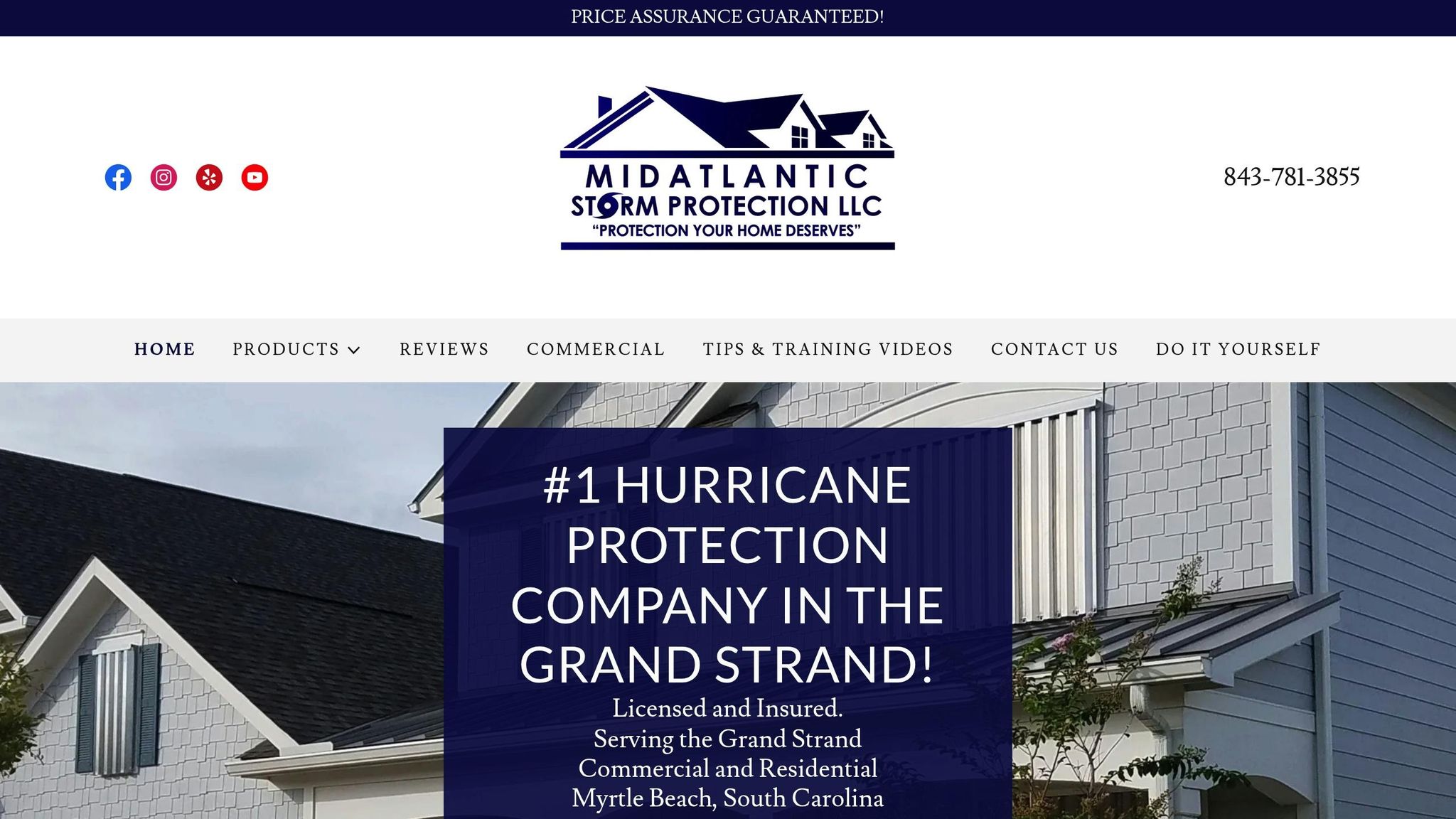


Hurricane Protection: Aluminum or Steel Mesh?

Make an appointment
Get a Free Estimate Today
Hurricane Protection: Aluminum or Steel Mesh?
When it comes to hurricane protection, choosing between aluminum and steel mesh screens can make a big difference for your home. Here’s a quick breakdown to help you decide:
- Aluminum Mesh: Lightweight, rust-resistant, and affordable. Best for moderate hurricane zones and homes needing more natural light. Easier to install and maintain but less durable against strong winds and impacts.
- Steel Mesh: Stronger and longer-lasting, ideal for high-risk hurricane areas. Handles stronger winds and debris but costs more, requires professional installation, and needs regular maintenance to prevent corrosion.
Quick Comparison
| Feature | Aluminum Mesh | Steel Mesh |
|---|---|---|
| Wind Resistance | Up to 140 mph | Over 170 mph |
| Durability | 8–12 years | 15–20 years |
| Weight | 0.8–1.2 lbs per sq ft | 2.5–3.0 lbs per sq ft |
| Cost | $8–$15 per sq ft installed | $12–$24 per sq ft installed |
| Light Transmission | 75–80% | 70% |
| Maintenance | Minimal (clean every 3–4 months) | Higher (quarterly inspections) |
Choose aluminum if you’re on a budget, need a lightweight option, or live in a moderate hurricane zone.
Go with steel if you need maximum protection, durability, and added security in high-risk areas.
For the best results, always ensure proper measurements, reinforced mounting (for steel), and professional installation.
Hurricane Aluminum Panel Test. 2018 Midatlantic Storm ...

Aluminum Mesh Screens
Properties of Aluminum Mesh
Aluminum mesh screens provide a balance between protection and visibility, making them a practical choice for hurricane defense. The tightly woven aluminum strands offer durability and strength, ensuring they can withstand demanding conditions.
Advantages of Aluminum Mesh
Aluminum naturally develops a protective oxide layer, making it resistant to rust - an essential feature for areas near the coast where salt exposure is common. Its lightweight nature not only makes installation easier but also minimizes strain on mounting hardware. Additionally, aluminum is an affordable option, further adding to its appeal.
Limitations of Aluminum Mesh
While aluminum mesh screens are durable and resistant to corrosion, their ability to handle extreme impacts depends on the specific design and how they’re installed. Ensuring proper installation and design is key to achieving the best performance.
sbb-itb-85e0110
Steel Mesh Screens
Properties of Steel Mesh
Steel mesh screens are designed to provide durable hurricane protection. They are made from high-tensile stainless steel, typically using 304 or 316-grade material, which is well-regarded for its strength and durability. The mesh is woven into precise patterns, with densities ranging from 12x12 to 14x14 strands per square inch. This setup strikes a balance between offering protection and maintaining visibility.
Advantages of Steel Mesh
Steel mesh screens are highly impact-resistant and effectively block flying debris during storms. Thanks to their tensile strength, they can absorb and evenly distribute impact forces, ensuring they remain intact even after repeated stress. This makes them particularly reliable during long storm seasons.
Their strength also allows for wider panel installations, which means fewer support frames are needed. This results in cleaner, less obstructed sight lines. Beyond storm protection, steel mesh screens enhance home security, as their sturdy construction resists cutting and tampering.
However, these advantages come with a few considerations.
Challenges of Steel Mesh
The weight of steel mesh screens requires strong mounting systems and professional installation. They are also more expensive than aluminum, typically costing 40-60% more upfront.
In coastal areas, regular maintenance is necessary to guard against corrosion. The heavier weight can also make removing and storing the screens during the off-season more difficult.
Another factor to consider is light transmission. The denser weave of steel mesh can block up to 30% of natural light compared to lighter alternatives. This reduction in brightness may impact indoor lighting, especially in areas where natural light is a priority. Carefully weigh these factors when deciding on the best solution for your windows.
Direct Comparison: Aluminum vs. Steel
Impact Resistance and Lifespan
Steel mesh handles impact far better than aluminum. While aluminum can endure winds up to 140 mph, steel withstands over 170 mph. Its superior tensile strength helps absorb and spread out impact forces more effectively.
In terms of lifespan, steel mesh generally lasts 15-20 years with proper care, compared to aluminum mesh, which typically needs replacing after 8-12 years. However, factors like local climate and maintenance play a role in durability.
Installation Requirements
Aluminum, weighing 0.8–1.2 lbs per square foot, is lighter and easier to handle. It requires minimal mounting hardware, and a standard aluminum frame can support panels up to 72 square feet.
Steel, on the other hand, is heavier at 2.5–3.0 lbs per square foot and needs reinforced mounting systems. Steel panels are typically limited to 96 square feet due to their weight. Professional installation is highly recommended for both materials, but it's especially critical for steel due to its weight and specific mounting needs.
| Installation Factor | Aluminum Mesh | Steel Mesh |
|---|---|---|
| Weight per sq ft | 0.8-1.2 lbs | 2.5-3.0 lbs |
| Max panel size | 72 sq ft | 96 sq ft |
| Frame requirements | Standard | Reinforced |
| DIY installation | Possible, not ideal | Not recommended |
Price Analysis
Aluminum mesh screens cost between $8 and $15 per square foot installed, while steel mesh installations range from $12 to $24 per square foot. The higher price for steel reflects not only the material itself but also the additional labor and hardware required for installation.
Over the long term, steel’s durability may offset its higher initial cost. With a longer lifespan, steel could prove more cost-effective over 20 years when factoring in maintenance and replacement needs.
Appearance and Visibility
The two materials also differ in aesthetics and light transmission. Aluminum mesh allows 75-80% of natural light through, thanks to its thinner profile, which also creates less visual obstruction.
Steel mesh, with its denser weave, transmits about 70% of light. However, it offers a more polished appearance and maintains better tension over time, avoiding the sagging that can sometimes affect aluminum mesh.
Upkeep Requirements
Maintenance needs vary depending on the material. Aluminum mesh requires cleaning every 3-4 months with mild soap and water. Its main challenges include preventing dents and dealing with oxidation, particularly in coastal areas.
Steel mesh requires more attention, especially in salty environments. A quarterly inspection is recommended to:
- Check for corrosion
- Clean with stainless steel-specific cleaners
- Inspect and tighten mounting hardware
- Apply protective coatings annually in coastal regions
These comparisons provide a solid foundation for your decision, with more details to come in the next section.
Making Your Choice
Key Differences Between Aluminum and Steel Mesh
When deciding between aluminum and steel mesh for hurricane protection, here’s what you need to keep in mind:
- Wind Resistance: Steel handles stronger winds better than aluminum.
- Durability: Steel lasts longer over time.
- Light Transmission: Aluminum lets in more natural light.
- Cost and Maintenance: Aluminum is more affordable and easier to maintain, while steel is sturdier but comes with higher costs and upkeep needs.
- Appearance: Aluminum provides clearer views, while steel has a heavier, more solid look.
Which One Should You Pick?
Go with aluminum mesh if you:
- Live in areas with moderate hurricane risks.
- Want more natural light and less obstruction to your views.
- Are working within a tight budget.
- Need a lightweight option for existing window or door frames.
- Prefer a low-maintenance solution.
Choose steel mesh if you:
- Live in high-risk hurricane zones.
- Need something built to last for years.
- Have sturdy, reinforced frames to support the heavier material.
- Want added security against intrusions.
- Are prepared to handle regular maintenance.
Once you’ve decided on the material, make sure to focus on accurate measurements and professional installation to get the best results.
What to Do Next
- Measure window and door openings, leaving extra space for secure mounting.
- Get a professional evaluation to ensure your structure can support the mesh.
- Check local building codes and permits to ensure compliance.
- Plan installation during the off-season (December–May) to save money and avoid delays.
For expert advice and installation that meets local codes, visit Bayshore Exteriors.